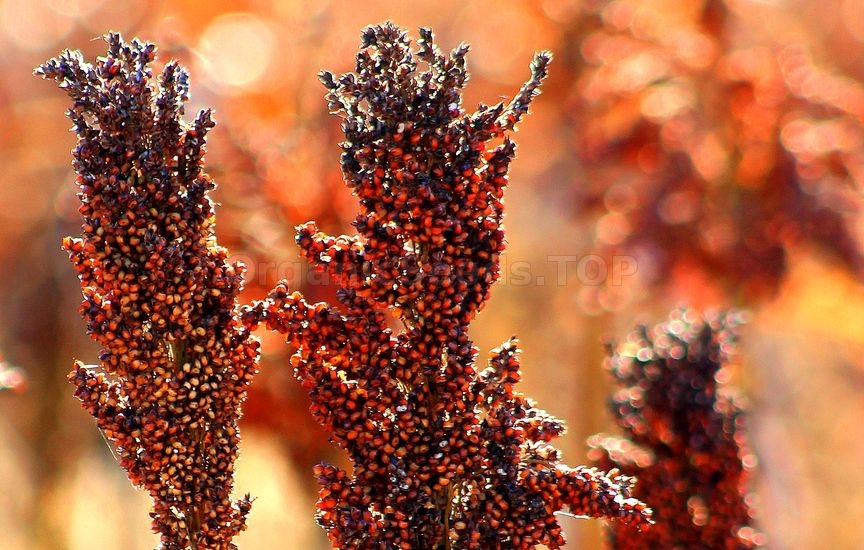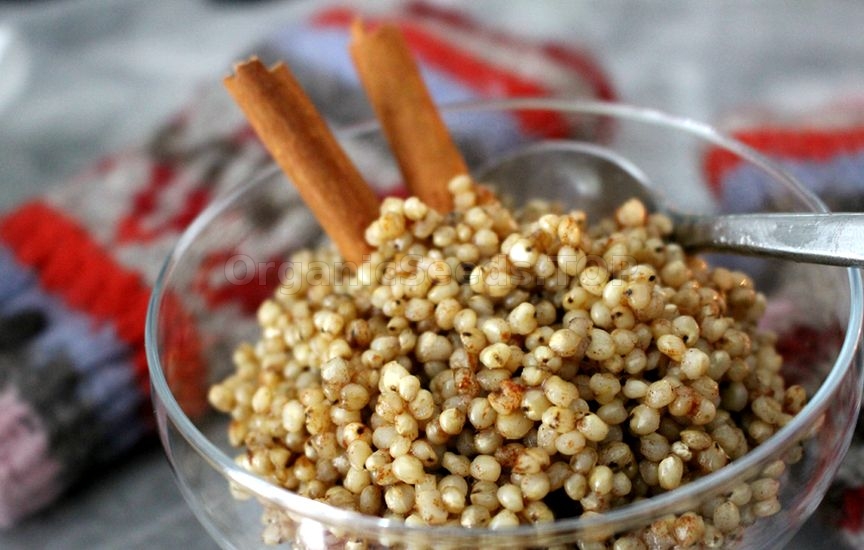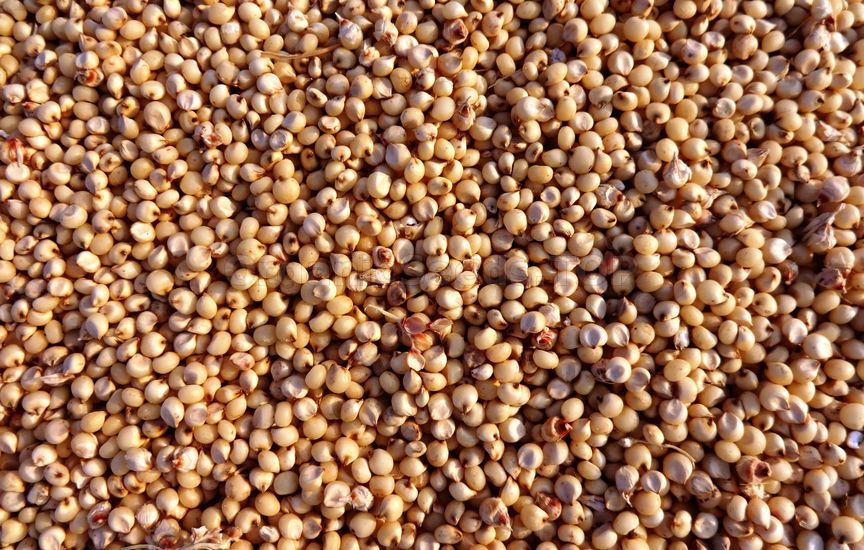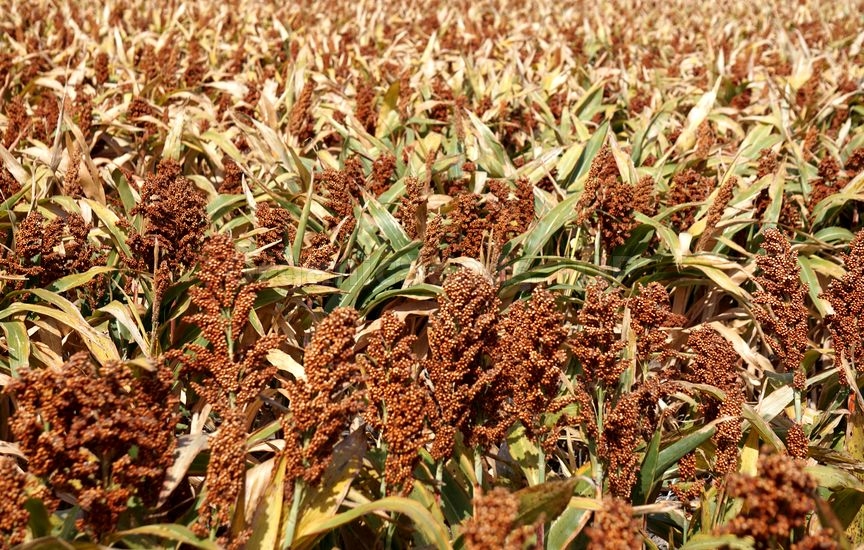Sorghum Facts and Health Benefits |
 Sorghum commonly known as broom corn, great millet, durra, jowari and milo is a large grain plant native to Northern Africa which is widely cultivated in tropical and subtropical regions these days. It is the member of the grass family Poaceae or Gramineae. It is the fifth most important cereal crop after wheat, corn, rice and barley. It is also known from various vernacular names such as French: Dari, Sorgho Penché; Italian: Dura, Sorugami; Malaysia: Jagung Gerebang, Jagung; Russian: Belaia Durra, Sorgo Venichnoe and Spanish: Daza, Zahina. Plant Sorghum is an erect, robust, herbaceous annual plant which is often 3-4 m in height. The Sorghum plant prefers tropical and subtropical climate. It can be grown successfully in variety of soils ranging from sandy, loamy and clay. A leaf which is broad and coarse is generally 5 cm in breadth and 0.75 m in length. The flower is hermaphrodite which flowers from August to October. The stem is rigid with grass blades flat, glabrous and waxy. The plant has fibrous root system. Branches are alternate, slender, drooping and inflorescence. It is an annual crop which has the lifespan of one year. GrainThe grains are 3 to 4 mm in diameter, tight-headed with round and droopy panicle. The seeds are round or oval in shape. Sorghum is sweet in taste and has a bland flavor. It is harvested from September to October.
Health Benefits of Sorghum Sorghum is an excellent source of riboflavin, Vitamin B6, thiamin and minerals such as iron, potassium, manganese and magnesium. The report shows that 192 gm is loaded with 632 Kcal which offers a calorie rich diet with other minerals and vitamins. It possess huge amount of carbohydrates, with 40.78% protein, 18.97% fat, 2.50% calcium and iron, vitamin B1, and nicotinic acid in small amounts. 1. Assists in digestionThe dietary fiber assists in the proper functioning of the digestive system. However, Sorghum is rich in dietary fiber. A single serving of Sorghum provides the dietary fiber by 48% of the daily recommended value. This assist in preventing the health conditions such as bloating, cramping, stomach aches, constipation, diarrhea and excess gas. The high amount of fiber helps to eliminate LDL cholesterol level which upgrades the heart health and also prevents heart attacks, atherosclerosis and strokes.
2. Prevents cancerVarious important antioxidants are possessed in the bran layer of the Sorghum. These antioxidants reduce the risk of cancer such as esophageal cancer. Antioxidants eliminate the free radicals from the body which leads the healthy cells to mutate into cancer cells.
3. Controls diabetesThe breakdown of excessive carbohydrates into simple sugars is the cause for diabetes. Sorghum possess high amount of tannin which prohibits the starch absorption by the body that regulates the glucose and insulin level in the body. Sorghum helps to balance these levels which eliminates the plunges and spikes in the glucose levels and also prevents the health complications and diabetics shock.
4. Helps celiac diseaseCeliac disease is an allergy to gluten found in wheat-based products. Normally wheat or gluten in found in various food items, it makes the situation worse. But Sorghum helps to relieve the nausea, painful inflammation and gastrointestinal damage caused by the gluten.
5. Maintain bone healthSorghum possess high amount of Magnesium which helps to maintain the calcium levels by increasing the absorption of calcium in the body. These two minerals are essential for the bone tissue development and to speed up the healing process of aging or damaged bones. This helps to forbid the health conditions such as arthritis and osteoporosis in the old age.
 6. Prevents anemiaSorghum possesses iron, copper and magnesium which help to increase the iron absorption in the body. This reduces the chances of anemia that is led by iron deficiency. An adequate amount of iron and copper increases the development of red blood cells, enhance the blood circulation, cellular growth, increases the hair growth and boost the level of energy.
7. Level of energyVitamin B6 is essential to transform food to the usable fuel and energy in the body. This helps to stabilize the energy throughout the day. Sorghum provides 28% of Vitamin B6 of the daily recommended value.
8. Assist thyroid healthManganese is a vital component of thyroxine which is an essential hormone in the thyroid gland. Sorghum is rich in manganese which helps to function the thyroid glands properly which results in losing weight, appetite, efficient organ systems and metabolism.
9. Improves cognitive powerThe function of brain and neurotransmitter is based on the phosphorus. Phosphorus helps to maintain the response of emotions, neurons and hormones. The phosphorus deficiency is associated with the decrease in cognitive power and age related neurodegenerative disorders such as dementia and Alzheimer’s disease.
10. Improves moodThe research shows that Vitamin B6 has a huge role in the production of serotonin and GABA neurotransmitters in the brain which controls the mood. Vitamin B6 is essential for to hinder pain, depression, anxiety and fatigue. This shows that Vitamin B6 helps to prevent mood disorders and raise mood.
Vitamin B6 also assists in the production of hormone in the brain which treats the brain diseases and mood disorders. The research shows that the supplements of Vitamin B6 assist to uplift the mood, relieve pain with energy and concentration. Nutritional Value of Sorghum Sorghum is loaded with nutrients, vitamins such as riboflavin, niacin, and thiamin, high amount of magnesium, copper, iron, phosphorous, calcium, and potassium. It provides dietary fiber by 48% of the recommended daily value.
Sorghum Facts Sorghum is the tall plant which yields Sorghum grains. It is the commonly grown crop after rice, corn, wheat and barley. It is cultivated in many Western countries. The diet which includes Sorghum provides various health benefits. Sorghum is also used to feed animals or processed into secondary products such as sorghum syrup and alcohol. Only few varieties are used for consumption purposes. |
|
|
